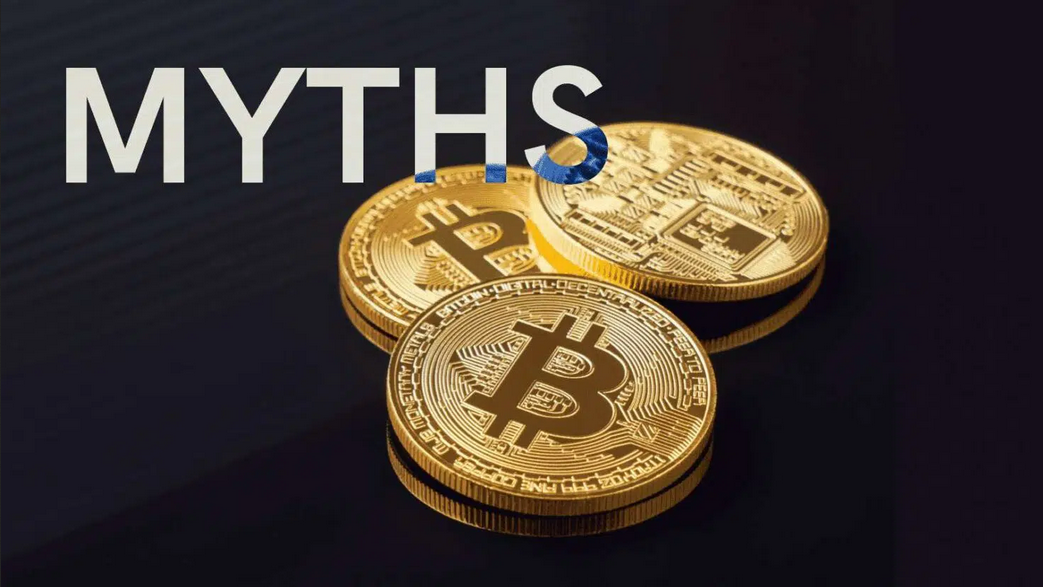Despite the fact that bitcoin is reaching new historical highs and fresh news is constantly emerging, it is important for every trader to know the myths and misconceptions about the first cryptocurrency. It is important to sort out how true they are. In this guide, we will look at the most interesting myths about bitcoin.
Myth #1: Bitcoin Is a Short-Lived Bubble That Will Soon Burst
Some people buy bitcoin as a risky investment in the hope of making a lot of money. But that does not mean that bitcoin itself is a bubble. Bubbles are short-term market phenomena characterised by volatile price increases that are not sustainable in the long term. A market bubble eventually bursts when investors realise that the current price of the product is well above its value. People often compare bitcoin to the Dutch “tulip mania” of the 17th century, a famous speculative bubble. During the Tulip Mania in 1637, the actions of speculators led to a 26-fold increase in the price of certain types of tulips. The speculative frenzy lasted for half a year, reached a very bad low and never returned to its former glory.
The truth:
- Over the 12 years of its existence, the bitcoin price rose and fell several times, but was always able to bounce back and reach new highs. As is usually the case with new technology, there are periods when it goes up and then periods when it goes down. In the 1990s, when the dot-com bubble burst, Amazon shares fell from $100 to $5. But in the years that followed, it became one of the most important companies in the world.
- Prominent bitcoin investors say that the way the price of bitcoin rises and falls is in line with the typical trend for new markets. Most people believe that Bitcoin will become more volatile in the near future, followed by long periods of fluctuation, and end with a period of equilibrium. But the decision will only be known as time passes.
Myth #2: Bitcoin Has No Practical Use at This Time
People who don’t like Bitcoin often say that it has no practical use in the real world, and if it does, it’s mostly for bad things. Both of those claims are not true. Bitcoin has a long history as a decentralized payment method that lets people send and receive money worldwide without needing intermediaries like banks or payment companies. Institutional investors, like gold, are increasingly interested in using Bitcoin as a hedge against inflation.
The truth:
- Bitcoin has gained much popularity in the modern world as an inflation-hedging currency similar to gold. It has been called “digital gold” because of this. More and more well-known funds and publicly traded companies (like Tesla, Square, and MicroStrategy) are buying large amounts of Bitcoin to improve their asset management methods.
- Bitcoin is scarce, like the precious metal gold, because the highest number of Bitcoins can be made is 21 million. Anyone interested in crypto for a while knows that gold’s physical properties make it hard to move and keep safe. Conversely, Bitcoin can be sent in a digital version just as quickly as sending an email.
Myth #3: Bitcoin Is Not a Currency With Any Real Value
Even though Bitcoin is not backed by a physical good like gold, this is true of most foreign currencies today, including the US dollar. Bitcoin is built with a trait that makes it hard to make more of it. This makes it more resistant to inflation. Inflation can happen when there are too many new units of paper currency, reducing the value of the ones already in circulation.
The truth:
- The highest number of Bitcoins that can ever be made is 21 million. The limited amount of this product is a significant factor in its worth.
- In addition to its natural limit, the Bitcoin supply has a set number of coins that can be made. Every four years, a ” halving ” situation happens, in which the block rewards given to the network’s miners are cut in half.
Myth #4: Bitcoin Will Soon Be Usurped by an Alternative Cryptocurrency
Bitcoin is often considered the first cryptocurrency, and its success has been unmatched in digital currencies. Although new cryptocurrencies have promised to surpass bitcoin through new features or other competitive advantages, they have not yet succeeded.
The truth:
- Even though many other cryptocurrencies have come out in the last ten years, Bitcoin has always remained the most important digital asset, with the most significant market capitalization by a wide margin.
- It controls 60% of the cryptocurrency market, which is a considerable amount.
- Bitcoin’s success can be explained by its “first-mover” edge and its commitment as a currency to being decentralized and open.
Myth #5: Bitcoin Investments Are a Form of Gambling
Bitcoin’s price has changed significantly over the past ten years, typical for a market still growing and young. Since Bitcoin’s genesis block was created in 2010, it has consistently gained a lot of long-term value, as shown by its market capitalization, now over $1 trillion (as of February 2021; please see the current market cap for up-to-date numbers). As the Bitcoin environment has grown, different countries’ strong regulations have made investing more accessible for institutions like Tesla and hedge funds.
The truth:
- A Bitcoin investor can be sure that the value of the Bitcoins they own will go up, unlike in a casino, where the odds are stacked in favor of the company. Even though we can’t predict what will happen, it’s worth noting that Bitcoin has consistently increased over the past ten years.
- Dollar-cost averaging is a popular way to spend that reduces the impact of market volatility. This method involves spending a set amount of money every week or month, no matter what the market is doing. This method leads to good results, no matter how the market moves, as long as it is on a bullish trajectory.
Myth #6: Bitcoin Is Not a Safe Currency
So far, there have been no successful hacking efforts on the Bitcoin network. Many security experts and computer scientists have carefully looked over the open-source code. Bitcoin’s innovative answer to the “double-spend” problem made it the first digital currency possible for trustless peer-to-peer currencies to become a reality. Also, knowing that all Bitcoin operations can be done is essential.
The truth:
Many myths about how secure Bitcoin comes from the fact that third-party businesses and services that use Bitcoin have been hacked, not the Bitcoin network itself. Some users are worried about the security of Bitcoin because of high-profile hacks on early Bitcoin companies with poor security protocols, like the one that happened to the Japan-based exchange Mt. Gox, and random data breaches, like the one that happened to users of the wallet provider Ledger.
Myth #7: Bitcoin Is Detrimental to the Health of the Planet
Bitcoin mining uses a lot of energy. In the crypto space, though, figuring out the ecological effect is tough. It is essential to remember that every part of the digital economy uses some energy. When we think about how big the global banking system is, we must also consider how much energy it takes to handle transactions and keep office buildings, ATMs, local branches, and other related groups running.
The truth:
- According to a recent study done by Ark Investment Management, Bitcoin is much more efficient on a world scale than traditional banking and gold mining.
- Renewable energy sources like sun, wind, and water power are a big part of the Bitcoin mining process. According to the Cambridge Bitcoin Electricity Consumption Index, the numbers range from 20% to over 70%.
Conclusion
You should not believe everything you hear about Bitcoin. It is important to understand its value to you, but don’t risk your entire budget on buying this cryptocurrency, because it is extremely volatile and requires a certain level of skill from traders.


